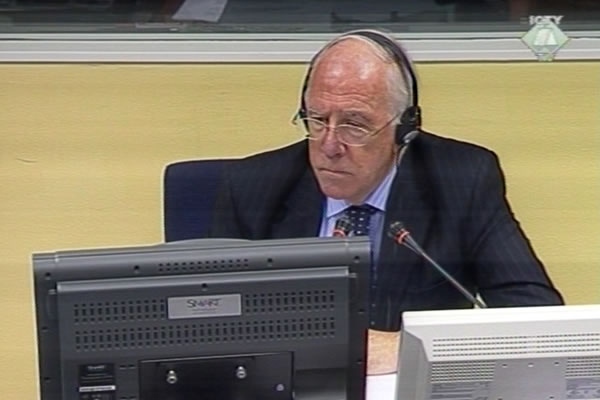Home
BRITISH AMBASSADOR’S VIVID RECOLLECTIONS
As former British ambassador to Belgrade, Sir Ivor Roberts, said, he thought the Bosnian Serb leadership was ‘the Frankenstein’s monster’ who no longer obeyed its creator Milosevic, ‘the arsonist’ behind the Balkan wars. Sir Roberts thought Ratko Mladic was ‘mentally deranged’. As for Jovica Stanisic, whose defense called him to give evidence, Sir Ivor Roberts described him as the ‘messenger who carried Milosevic’s threats’
 Ivor Roberts, defence witness of Jovica Stanisic
Ivor Roberts, defence witness of Jovica Stanisic Jovica Stanisic’s defense today called former British ambassador to Belgrade, Sir Ivor Roberts. Stanisic’s defense intended to present the indicted chief of the Serbian State Security Service as an active participant in the peace efforts of the Serbian authorities headed by Slobodan Milosevic, in a bid to contest the allegations in the indictment that Stanisic, together with his co-accused Franko Simatovic and other high-ranking officials in Serbia, Republika Srpska and the RSK, participated in a joint criminal enterprise aimed at ethnically cleansing large parts of Croatia and BH.
As soon as the examination-in-chief started, it was clear that Roberts’s testimony would not support the defense case to any great extent. In light of Milosevic’s conflict with the Bosnian Serb leadership in 1993 and 1994 about the end of the war in BH, the defense counsel put it to the witness that the Belgrade regime – of which Stanisic was part – wanted a peaceful solution to the Bosnian conflict. As the defense counsel said, the war-mongering Serbs from Pale obstructed this effort, and as a consequence, in 1994 Serbia imposed sanctions on Republika Srpska. Milosevic only accepted the peace agreements on the table because he was aware that the Bosnian Serb army was ‘about to break apart’ and to end the international sanction regime against an economically drained Serbia, the witness replied.
The witness arrived in the British embassy in Belgrade in March 1994. His impression was that the Bosnian Serb leadership, headed by Radovan Karadzic, was ‘like a Frankenstein’s monster’ that no longer obeyed its creator, Milosevic. The ‘monster’ didn’t break away completely, because the conflict existed only on the political level, the witness recalled. The armies and security services of Serbia and Republika Srpska continued their cooperation.
In the cross-examination, Roberts for the most part agreed with what prosecutor Farr put to him. The prosecutor argued that in 1993, Milosevic accepted peace plans not because he was a humanitarian or cared for civilians’ lives, but because he thought it was time to cement the military successes and the ethnic cleansing of the territory under the Serb army control. The witness said that Milosevic’s goal was to become a ‘new Tito’. When that failed, Milosevic started carving out the Serb territories from Croatia and BH with the help of ‘his local minions’. As Roberts said, the Serbian president was an ‘arsonist’ who went around setting fires only to return to the scene with buckets of water to put out the fires he himself had started. Finally the witness recalled the words of an international negotiator who compared Milosevic to a Chicago gangster who got ‘bored with criminal activities’ and wanted to ‘cash in his chips’ and go on living a peaceful life.
The witness described his one and only meeting with Ratko Mladic, saying that he got confused when, in the middle of the meeting, the Bosnian Serb army war commander started ‘rambling obscurely’ about the British empire and then moved on to the topic of shirts. Mladic ‘threatened’ he would stop buying British silk shirts because of the way in which Roberts and his fellow countrymen treated Serbs. Mladic said that from the end of World War II, he only wore British silk shirts. His mother used British parachutes used to airdrop humanitarian aid to sew Mladic’s shirts. ‘I thought he was mentally deranged’, the witness concluded.
The prosecutor then addressed the role of the accused Stanisic in the eventual release of UN hostages in 1995. The UN staff were captured by the Bosnian Serb authorities and the army to prevent NATO strikes against their positions. The prosecutor showed a cable from the British embassy in Belgrade which states at the time that Milosevic might send Jovica Stanisic to Pale to convince Karadzic to release the hostages with ‘a tested and true mixture of death threats, blackmail and bribes’. Asked if Stanisic was in effect Milosevic’s ‘messenger who carried death threats’, the witness agreed, adding that Karadzic was afraid of Stanisic. The witness said that the Serbian State Security Service chief knew the secrets of the Pale leaders and could either blackmail them or offer them military assistance as a bribe.
The trial of Jovica Stanisic and Franko Simatovic continues on Wednesday with an administrative hearing, followed by a one month break.
Linked Reports
- Case : Stanisic & Simatovic
- 2012-03-21 FRAUD OR NOT FRAUD
- 2012-03-20 ‘ANOMALIES’ IN MLADIC’S NOTEBOOKS
- 2012-03-14 WITNESS WITH A SHADY PAST
- 2012-03-29 STANISIC AND SIMATOVIC TRIAL ADJOURNED FOR A MONTH
- 2012-04-20 PROSECUTION AND STANISIC’S DEFENSE DON'T AGREE OVER MLADIC’S DIARIES
- 2012-05-01 ‘INTEGRATIVE CHARACTER’ OF MUP AND SERBIAN STATE SECURITY SERVICE
